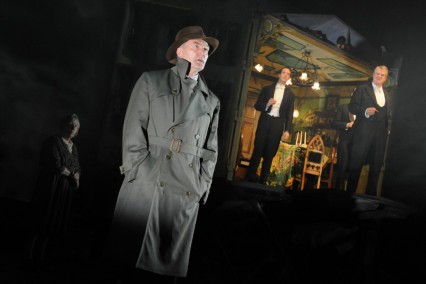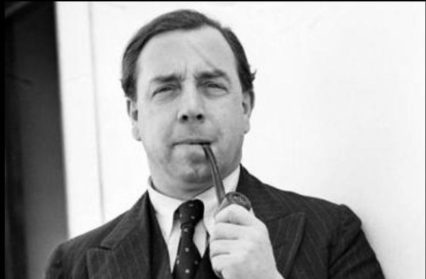Dylan Moore travels to the New Theatre in Cardiff to witness the latest production of J.B. Priestley’s classic, An Inspector Calls.
J.B. Priestley’s whodunit about social responsibility, written in 1945 but set in the death throes of the Edwardian golden age, has had some of its hard edges taken off over the years. In 1954, a film version starring Alastair Sim cast the ghoulish inspector as a benignly remote presence at the Birling family table, uncovering the secrets of ‘hard-headed businessman’ Arthur, his cold-hearted aristocratic wife Sybil and their spoilt brat grown-up children Sheila and Eric, as well as Sheila’s new fiancé Gerald Croft. In the film, we also meet Eva Smith – the working-class girl whose suicide is the result of a series of encounters with the Birlings – but the whole point of the play is that we never meet Eva face-to-face, only through what we are told; the mystery thrives on our never-quite-knowing. Just as we are unsure as to the identity of the inspector – champion of the voiceless poor – we share some of the doubts of the characters as to the veracity his tale. All of the family have mistreated a girl. But is it the same girl? And does that matter?

By J.B. Priestley
New Theatre, Cardiff
Director: Stephen Daldry
Cast: Tom Mannion, Geoff Leesley,
Karen Archer, Kelly Hotten
These questions will be familiar to generations of school pupils who have studied An Inspector Calls –
Enter Stephen Daldry, the Billy Elliot director about to get a new shorthand epithet due to his work on the London Olympics’ opening ceremony. Daldry dreamed up a radical new production that – quite literally – blew up this dysfunctional family drama. Although tonight’s cast have never even met the original director, they revealed afterwards that there was little scope for further changes to the 1992 piece on this tour, a spin-
The most striking aspect of the production is Ian McNeil’s design: the Birlings begin ensconced inside a suburban villa that swings open to reveal a sloping naturalistic interior on the arrival of the inspector. We see the family from the outside, the brightly-
Despite the intended friction between the An Inspector Calls’ 1912 setting and 1945 composition, there is also a contemporary resonance in the fact of Eva Smith’s dismissal for wanting a rise to 25 shillings a week from 22s 6d. Eric, the son who grows from a boy to a man over the play’s course, increasingly in conflict with his father, comments: ‘It isn’t a free country if you can’t go and work somewhere else.’ This line, like much else in the play, seems particularly relevant in 2012, vindicating exam board decisions to keep it on the curriculum.
Edna, the parlour maid who in the original Priestley script does little more than open the door for the inspector, is here a pointed omnipresence. Together with a chorus dressed in outfits from the play’s original performance date of 1945, she represents those who voted in Attlee’s post-
Occasionally the shouting and screaming and the breakneck pace with which An Inspector Calls is delivered – the director having dispensed with an interval –
At the play’s end, the complacent older generation attempt to clear up the mess their lives have been left in, ‘ready to go on in the same old way’. But the inspector’s visit has the younger characters beginning to readjust not only family relationships but social structures: ‘We are members of one society,’ says Tom Mannion’s inspector in his set-
You might also like…
Thomas Tyrrell travelled to the New Theatre for Wales Millennium Centre’s new stage adaptation of Agatha Christie’s The Mirror Crack’d.
Dylan Moore is a frequent contributor to Wales Arts Review.












